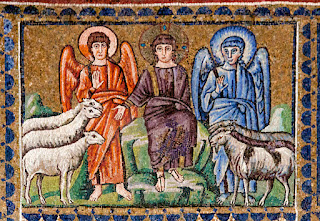Matthew 25, 31-46 (Madsen)

When the Son of Man comes, illumined by the light of revelation, surrounded by all angels then he will ascend the throne of the kingdom of his revelation. He will gather before his countenance all the peoples of the world and he will cause a division among them, as a shepherd separates the sheep from the goats, the sheep on his right, and the goats on his left. Then, as king, he will say to those on his right, “Come here, you who are blessed by my Father, you shall receive as your own the kingdom which has been intended for you from the creation of the world. I was hungry, and you gave me to eat; I was thirsty, and you gave me to drink; I was a stranger, and you took me in; I was naked, and you clothed me; I was ill, and you looked after me; I was in prison and you came to me.”
Then those who are devoted to God will answer, “Lord, when was it that we saw you starving and we fed you, or saw you thirsty and gave you to drink? When did we see you as a stranger and take you in, or see you naked and clothe you? When did we visit you when you were you ailing or in prison?
And the king will say to them, “Yes, I say to you, what you did for the least of my brothers and sisters, that you did it for me.”
 |
S. Apollinare Nuovo, Ravenna
|
Then they will also answer, “Lord, when did we see you hungry and did not give you to eat, or thirsty and did not give you to drink, or a stranger or naked or ill or in prison and did not help you?”
Then he will answer, “Yes, I say to you, what you neglected to do for the least of my brethren, you failed to do for me.” And thy will become subject to the aeon of anguish, while those devoted to God shall find the aeon of life.
4th Advent
December 23, 2018
Matthew 25:31- 46 (Madsen)
By their nature, goats are curious and adventuresome. They are lusty and will eat anything. They are often used to symbolize our lower nature and even the adversary forces that work in us. Sheep, on the other hand, are by their nature mild. They give freely of their coats of wool. And they allow themselves to be led to the slaughter without resistance. John the Baptist referred to Christ Jesus as the Lamb of God. This Lamb represents the highest forces in us – the offering of self for the good of the other.
We human beings are of dual nature. We each have a goat and a lamb within us. In the end, whether our soul stands on the right or the left of the Lamb’s Throne will depend on which side of our nature we breed and cultivate: Whether we cultivate our own self-enjoyment or the Lamb within the soul.
In the parable, Christ makes it clear that our curiosity and adventuring, our relationship to food and drink and love are to become Lamb-like. They are to be placed in the service of others. We are to feed others; place the courage of our adventurousness at the service of the approaching stranger, the ill, the imprisoned. Like the Lamb, we are to clothe others out of our own substance. For it is clear that Christ dwells in other human beings.
Interestingly, it is not necessary to be able to recognize Christ in other human
 |
| Homeless Man |
The poet Willam Blake* sums up our complicated nature:
To Mercy, Pity, Peace, and Love
All pray in their distress;
And to these virtues of delight
Return their thankfulness.
Is God, our father dear,
And Mercy, Pity, Peace, and Love
Is Man, his child and care.
For Mercy has a human heart,
Pity a human face,
And Love, the human form divine,
And Peace, the human dress.
Then every man, of every clime,
That prays in his distress,
Prays to the human form divine,
Love, Mercy, Pity, Peace.
And all must love the human form,
In heathen, Turk, or Jew;
Where Mercy, Love, and Pity dwell
There God is dwelling too.
* William Blake. “The Divine Image”



